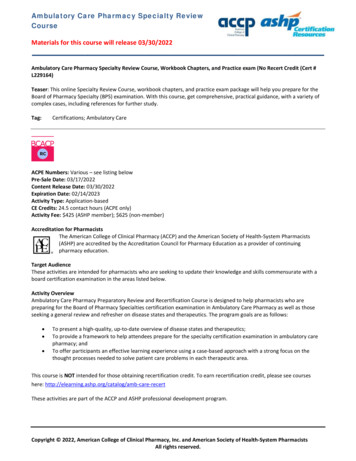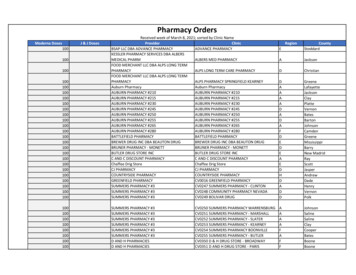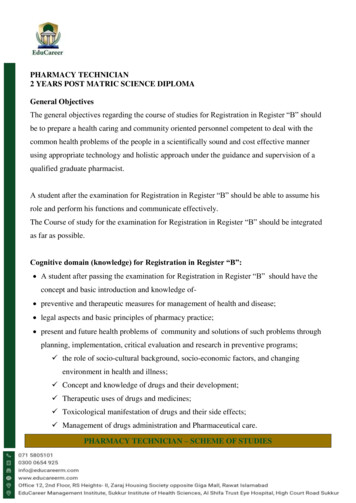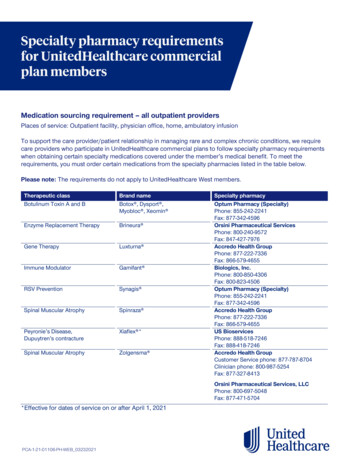
Transcription
Ambulatory Care Pharmacy Specialty ReviewCourseMaterials for this course will release 03/30/2022Ambulatory Care Pharmacy Specialty Review Course, Workbook Chapters, and Practice exam (No Recert Credit (Cert #L229164)Teaser: This online Specialty Review Course, workbook chapters, and practice exam package will help you prepare for theBoard of Pharmacy Specialty (BPS) examination. With this course, get comprehensive, practical guidance, with a variety ofcomplex cases, including references for further study.Tag:Certifications; Ambulatory CareACPE Numbers: Various – see listing belowPre-Sale Date: 03/17/2022Content Release Date: 03/30/2022Expiration Date: 02/14/2023Activity Type: Application-basedCE Credits: 24.5 contact hours (ACPE only)Activity Fee: 425 (ASHP member); 625 (non-member)Accreditation for PharmacistsThe American College of Clinical Pharmacy (ACCP) and the American Society of Health-System Pharmacists(ASHP) are accredited by the Accreditation Council for Pharmacy Education as a provider of continuingpharmacy education.Target AudienceThese activities are intended for pharmacists who are seeking to update their knowledge and skills commensurate with aboard certification examination in the areas listed below.Activity OverviewAmbulatory Care Pharmacy Preparatory Review and Recertification Course is designed to help pharmacists who arepreparing for the Board of Pharmacy Specialties certification examination in Ambulatory Care Pharmacy as well as thoseseeking a general review and refresher on disease states and therapeutics. The program goals are as follows: To present a high-quality, up-to-date overview of disease states and therapeutics;To provide a framework to help attendees prepare for the specialty certification examination in ambulatory carepharmacy; andTo offer participants an effective learning experience using a case-based approach with a strong focus on thethought processes needed to solve patient care problems in each therapeutic area.This course is NOT intended for those obtaining recertification credit. To earn recertification credit, please see courseshere: hese activities are part of the ACCP and ASHP professional development program.Copyright 2022, American College of Clinical Pharmacy, Inc. and American Society of Health-System PharmacistsAll rights reserved.
Ambulatory Care Pharmacy Specialty ReviewCourseMaterials for this course will release 03/30/2022REVIEW COURSEThis course consists of 19 activities (see table below) and provides up to 24.5 contact hours of continuing pharmacyeducation credit. The Review Course includes case-based presentations for application to real-life scenarios, workbook, apractice exam along with correct answers, and links to the reference sources, and domains, tasks, and knowledgestatements. To help you further prepare, this package includes a compilation of practice questions in the same format andrigor to help you prepare for the BPS Specialty Examination.For full program information, please visit: CPE ExpirationDateLearning ModuleACPE NumberCredit HoursTrial Design and Biostatistics - Module IA0217-9999-22-050-H04-P2.503/03/25Endocrine Disorders - Module IB0217-9999-22-051-H01-P1.503/03/25Genitourinary, Electrolytes, and NutritionalDeficiencies/Supplementation in Older Adults - Module 1C0217-9999-22-049-H01-P103/03/25Cardiology I - Module 2A0217-9999-22-052-H01-P1.503/03/25Cardiology II - Module 2B0217-9999-22-053-H01-P1.503/03/25Bone/Joint and Rheumatology - Module 2C0217-9999-22-054-H01-P103/03/25Diabetes Mellitus - Module 3A0217-9999-22-055-H01-P1.503/03/25Obstetrics and Gynecology - Module 3B0217-9999-22-056-H01-P1.503/03/25Pulmonary Disorders - Module 3C0217-9999-22-057-H01-P103/03/25Practices and Processes of Care - Module 4A0217-9999-22-058-H04-P103/03/25Communication Strategies in Pharmacy - Module 4B0217-9999-22-059-H04-P103/03/25Developing and Managing a Clinical Practice - Module 4C0217-9999-22-060-H04-P1.503/03/25Psychiatric Disorders - Module 5A0217-9999-22-061-H01-P1.503/03/25Neurology - Module 5B0217-9999-22-062-H01-P103/03/25Gastrointestinal Disorders - Module 5C0217-9999-22-063-H01-P1.503/03/25Infectious Diseases I - Module 6A0217-9999-22-064-H02-P103/03/25Infectious Diseases II - Module 6B0217-9999-22-065-H01-P103/03/25Nephrology - Module 6C0217-9999-22-066-H01-P103/03/25Dermatologic and Eyes, Ears, Nose, and Throat, andImmunologic Disorders - Module 6D0217-9999-22-067-H01-P103/03/25Copyright 2022, American College of Clinical Pharmacy, Inc. and American Society of Health-System PharmacistsAll rights reserved.
Ambulatory Care Pharmacy Specialty ReviewCourseMaterials for this course will release 03/30/2022Learning ObjectivesAt the end of the presentations, the pharmacist should be able to:Trial Design and Biostatistics - Module IAACPE #: 0217-9999-22-050-H04-P Describe hypothesis testing and state the meaning of and distinguish between p values and confidence intervals,and measures of central tendency and data spread. Define, compare, and contrast the concepts of internal and external validity, causation, association, bias, andconfounding in trial design. Select strategies to eliminate or control for bias and improve internal and externalvalidity. Compare and contrast the advantages and disadvantages of various study designs (e.g., prospective, retrospective,case-control, cohort, cross-sectional, randomized controlled clinical trials, systematic review, meta-analysis). Determine why a statistical test is appropriate or not appropriate, given the sample distribution, data type, andstudy design. Interpret statistical and clinical significance for results from commonly used statistical tests. Define and evaluate odds ratio, risk/incidence rate, relative risk, number needed to treat, number needed to harm,and other risk estimates.Endocrine Disorders - Module IBACPE #: 0217-9999-22-051-H01-P Identify appropriate thyroid hormone replacement therapy dosing strategies for patients with hypothyroidism andhyperthyroidism. Recommend appropriate patient-specific pharmacotherapy for the treatment of polycystic ovary syndrome. Medically manage a patient with hyperprolactinemia, acromegaly, and growth hormone deficiency. Differentiate between available weight-loss medications and design a patient-specific treatment plan. Recognize the clinical presentation, and design a treatment plan for, a patient with adrenal gland disorders andCushing disease. Compare available testosterone (T) replacement products and list appropriate monitoring guidelines forhypogonadism.Genitourinary, Electrolytes, and Nutritional Deficiencies/Supplementation in Older Adults - Module 1CACPE #: 0217-9999-22-049-H01-P Identify and assess common genitourinary diseases, electrolyte abnormalities, and nutritional deficiencies inambulatory older adults. Evaluate and manage drug-induced causes of benign prostatic hyperplasia (BPH), urinary incontinence, erectiledysfunction (ED), electrolyte abnormalities, and nutritional deficiencies in ambulatory older adults. Compare and contrast pharmacologic interventions for BPH, urinary incontinence, ED, electrolyte abnormalities,and nutritional deficiencies. Formulate treatment strategies for BPH, urinary incontinence, ED, electrolyte abnormalities, and nutritionaldeficiencies using patient-specific information.Cardiology I - Module 2AACPE #: 0217-9999-22-052-H01-P Evaluate the appropriate use of aspirin for primary prevention of cardiovascular (CV) events according to practiceguidelines and clinical trial evidence. Design an evidence-based treatment and monitoring strategy for patients with hypertension (HTN) that considersgoals of therapy, comorbid conditions, and compelling indications.Copyright 2022, American College of Clinical Pharmacy, Inc. and American Society of Health-System PharmacistsAll rights reserved.
Ambulatory Care Pharmacy Specialty ReviewCourseMaterials for this course will release 03/30/2022 Create an evidence-based treatment and monitoring plan for patients receiving lipid-lowering therapies forprimary and secondary prevention of atherosclerotic cardiovascular disease (ASCVD) and hypertriglyceridemia.Devise an evidence-based treatment plan for secondary prevention of acute coronary syndrome (ACS), stroke andtransient ischemic attack (TIA), and peripheral arterial disease (PAD).Cardiology II - Module 2BACPE #: 0217-9999-22-053-H01-P Formulate appropriate oral anticoagulant treatment strategies for patients who develop venousthromboembolism (deep venous thrombosis or pulmonary embolism), nonvalvular atrial fibrillation, or who havemechanical heart valves consistent with available consensus panel guidelines, recent U.S. Food and DrugAdministration approvals, and randomized clinical trials. Describe key differences in onset of action, dosing, administration, absorption, effects on common coagulationtests, and drug interactions between dabigatran, rivaroxaban, apixaban, edoxaban, and warfarin. Develop patient-specific, guideline-driven treatment, monitoring, and follow-up plans for patients with heartfailure, atrial fibrillation, or ventricular tachycardia. Identify treatment goals, common adverse effects, clinically important drug interactions, monitoring, and riskevaluation and mitigation strategies requirements for oral pharmacotherapy of pulmonary arterial hypertension.Bone/Joint and Rheumatology - Module 2CACPE #: 0217-9999-22-054-H01-P Systematically identify patients to screen for osteoporosis, and use the screening results to guide the decision onhow to treat the patient. Use a STEPS-wise approach (safety, tolerability, efficacy, preference [pearls], simplicity) for comparing,recommending, and justifying a drug therapy regimen for osteoporosis, rheumatoid arthritis (RA), psoriaticarthritis (PsA), osteoarthritis (OA), fibromyalgia, gout, and systemic lupus erythematosus (SLE). Choose a drug therapy for OA or fibromyalgia syndrome on the basis of drug efficacy and a patient’s comorbidconditions. Select screenings or laboratory tests at correct intervals for patients with RA, PsA, or SLE treated with diseasemodifying antirheumatic drug (DMARD) or biologic DMARD therapies. Formulate a care plan to help patients decrease their uric acid concentrations, gout symptoms, and gouty attacksusing nonpharmacologic and pharmacologic interventions.Diabetes Mellitus - Module 3AACPE #: 0217-9999-22-055-H01-P Identify differences between prediabetes, type 1 diabetes mellitus (T1DM), type 2 diabetes mellitus (T2DM), andgestational diabetes mellitus (GDM), including differences in diagnostic criteria and clinical presentation. Describe the pathophysiology of T1DM and T2DM. Compare agents used in the treatment of diabetes mellitus (DM), including their mechanisms of action, adverseeffects, contraindications, advantages, and disadvantages. Select appropriate insulin regimens for patients on the basis of desired onset, peak, and duration of insulin effects. Individualize a comprehensive glycemic treatment and monitoring plan for a patient with prediabetes, DM, andGDM. Discuss appropriate blood pressure and lipid management for patients with DM. Discuss the acute and chronic complications associated with DM and strategies to prevent them or slow theirprogression.Copyright 2022, American College of Clinical Pharmacy, Inc. and American Society of Health-System PharmacistsAll rights reserved.
Ambulatory Care Pharmacy Specialty ReviewCourseMaterials for this course will release 03/30/2022Obstetrics and Gynecology - Module 3BACPE #: 0217-9999-22-056-H01-P Recommend therapy for contraception, infertility, menstrual disorders, endometriosis, and symptoms ofmenopause on the basis of patient-specific information. Recommend appropriate treatment for common acute and chronic conditions in pregnancy and lactation. Recommend therapy for menopause on the basis of patient-specific information. Develop provider and patient education regarding medication use during pregnancy and lactation, contraception,infertility, menstrual disorders, endometriosis, and postmenopausal therapy.Pulmonary Disorders - Module 3CACPE #: 0217-9999-22-057-H01-P Compare and contrast between common features of patients with asthma or chronic obstructive pulmonarydisease (COPD). Select appropriate evidence-based treatment for patients with asthma, COPD, and/or nicotine dependence basedon specific patient factors and comorbidities. Develop a comprehensive education plan with monitoring parameters for patients on therapy for asthma, COPD,and/or smoking cessation. Compare and contrast the different respiratory inhaler devices and holding chambers. Integrate brief behavioral counseling and smoking cessation best practices when assisting a patient with quittingsmoking.Practices and Processes of Care - Module 4AACPE #: 0217-9999-22-058-H04-P Discuss issues with transitions of care, including a pharmacist’s role in achieving quality measures and improvingthe process. Describe different types of patient care services or practice models provided by a pharmacist within an ambulatorypractice, along with any applicable regulatory requirements. Apply tools and resources to detect, classify, report, analyze, and reduce preventable and non-preventable adversedrug events. Use formulary management activities and other resources to improve the prescribing of safe, effective, andaffordable treatments in an organization.Communication Strategies in Pharmacy - Module 4BACPE #: 0217-9999-22-059-H04-P Use strategies that develop patient rapport, foster trust, and effectively and efficiently obtain accurate,comprehensive histories, despite potential barriers in communication. Use assessments of patients’ knowledge, health literacy, self-management skills, health beliefs, and attitudestoward medications to tailor educational interventions that will improve adherence and self- efficacy. Communicate patient care activities and medication-related information effectively to other health careprofessionals verbally and in writing through the medical record. Discuss factors and methods used to assess and select appropriate written educational materials intended for thegeneral public.Copyright 2022, American College of Clinical Pharmacy, Inc. and American Society of Health-System PharmacistsAll rights reserved.
Ambulatory Care Pharmacy Specialty ReviewCourseMaterials for this course will release 03/30/2022Developing and Managing a Clinical Practice - Module 4CACPE #: 0217-9999-22-060-H04-P Perform an internal and external environmental scan and needs assessment to determine the need for andorganizational value of an ambulatory pharmacist–provided patient care service. Discuss steps to implement an ambulatory service, including identifying key stakeholders and developing essentialclinic operational activities. Develop a robust and sustainable quality assessment program using the balanced scorecard concept for yourclinical service and identifying quality measures important to your organization and patient population. Develop a credentialing and privileging process to ensure the competency of pharmacists providing direct patientcare in your ambulatory service. Identify and implement revenue-generating opportunities for pharmacist-provided patient care services indifferent ambulatory care settings.Psychiatric Disorders - Module 5AACPE #: 0217-9999-22-061-H01-P Analyze the Diagnostic and Statistical Manual of Mental Disorders, 5th Edition (DSM-5) criteria and disease coursefor anxiety disorders, sleep disorders, major depression, bipolar disorder, attention-deficit/hyperactivity disorder,schizophrenia, and substance use disorders. Apply a working knowledge of common drug and nondrug therapies for psychiatric disorders, including drug, dose,frequency, adverse effects, drug interactions, and monitoring values. Recommend appropriate treatments, including both lifestyle modification and specific drug therapy (medicationdose, schedule, and delivery system), on the basis of relevant patient factors (pharmacodynamic, physiologic,pharmacokinetic, and socioeconomic parameters). Monitor for adverse drug effects, drug-drug and drug-disease interactions, and appropriateness of therapy,including polytherapy.Neurology - Module 5BACPE #: 0217-9999-22-062-H01-P Given a patient case, select an appropriate antiepileptic drug (AED) regimen for a patient with epilepsy on thebasis of seizure type and AED mechanism of action, common adverse effects, and drug interactions. Recommend an appropriate pharmacologic therapy for a patient with episodic or chronic migraine headache. Recommend and manage appropriate disease-modifying therapy for a patient with multiple sclerosis (MS) on thebasis of MS subtype and other patient-specific factors. Recommend an appropriate pharmacologic therapy for a patient with Parkinson disease, neuropathic pain, orAlzheimer disease.Gastrointestinal Disorders - Module 5CACPE #: 0217-9999-22-063-H01-PGastrointestinal (GI) disorders within the objectives refer to the disorders covered in this chapter and include the following:gastroesophageal reflux disease, peptic ulcer disease, chronic liver disease manifestations, viral hepatitis, malabsorptionsyndrome, diarrhea, constipation, nausea and vomiting, irritable bowel syndrome, and inflammatory bowel disease. Apply national guideline–based treatment strategies for gastrointestinal (GI) disorders. Assess the benefits and risks of drug therapy for patients with GI disorders. Recommend appropriate nonpharmacologic and pharmacologic interventions for managing GI disorders. Develop and implement a patient-specific comprehensive therapeutic plan for managing GI disorders. Provide drug-related patient education and counseling for pharmacologic therapies used in managing GI disorders.Copyright 2022, American College of Clinical Pharmacy, Inc. and American Society of Health-System PharmacistsAll rights reserved.
Ambulatory Care Pharmacy Specialty ReviewCourseMaterials for this course will release 03/30/2022Infectious Diseases I - Module 6AACPE #: 0217-9999-22-064-H02-P Identify the clinical presentations of sexually transmitted infections, and design appropriate treatment regimens. Describe the mechanisms of action and adverse effects associated with antiretroviral agents, and identify majordrug interactions associated with them. Formulate treatment strategies for the management of HIV and commonly encountered opportunistic infections. Design appropriate strategies for treatment and prevention of influenza and other viral infections. Explain the risk factors for superficial and endemic fungal infections, and design corresponding treatmentregimens.Infectious Diseases II - Module 6BACPE #: 0217-9999-22-065-H01-P Design appropriate pharmacologic and nonpharmacologic treatment regimens for patients with urinary tractinfections, prostatitis, community-acquired pneumonia, sinusitis, pharyngitis, acute otitis media, skin and softtissue infections, latent tuberculosis infection, conjunctivitis, Lyme disease, antibiotic prophylaxis, infectiousdiarrhea, and Clostridioides difficile infections. Identify risk factors and clinical circumstances for antimicrobial resistance. Design an antimicrobial therapeutic regimen to treat resistant infections and prevent their future development. Apply evidence-based medicine and patient-specific factors to design antimicrobial regimens that are appropriateand cost-effective for the patient.Nephrology - Module 6CACPE #: 0217-9999-22-066-H01-P Identify a patient at risk of developing, or presenting with, acute kidney injury, drug-induced kidney disease, orchronic kidney disease (CKD), and formulate an appropriate care plan to mitigate risk and slow progression. Using appropriate data, assess kidney function, dialysis regimen information, andpharmacokinetic/pharmacodynamic drug properties in a patient to inform clinical decision-making. Formulate an evidence-based treatment plan for managing the most common medical problems in patients withCKD, including anemia, CKD-related mineral and bone disorder, and hyperkalemia. Describe Medicare Part B and D policies related to end-stage renal disease (ESRD) and dialysis care (i.e., ESRDProspective Payment System, Quality Incentive Program, Conditions for Coverage, Centers for Medicare &Medicaid Services Comprehensive ESRD Care Model) and their respective effects on medication use.Dermatologic and Eyes, Ears, Nose, and Throat, and Immunologic Disorders - Module 6DACPE #: 0217-9999-22-067-H01-P Formulate an ophthalmologic drug therapy regimen for a patient presenting with macular degeneration, dry eyesyndrome, or glaucoma. Construct an individualized pharmacy care plan for a patient with allergic rhinitis. Using a treatment algorithm, initiate, change, and modify topical and oral therapeutic regimens for acne. Recommend single or multiple topical and systemic agents for treating plaque psoriasis given a patient’s diseasepresentation, severity, and prior therapies. Effectively educate a patient presenting with a skin infestation or minor burn on the purpose, proper use, andpotential adverse reactions of the first-line treatment options.Copyright 2022, American College of Clinical Pharmacy, Inc. and American Society of Health-System PharmacistsAll rights reserved.
Ambulatory Care Pharmacy Specialty ReviewCourseMaterials for this course will release /Ambulatory-Care/Course-Faculty)Erica F. Crannage, Pharm.D., FCCP, BCPS, BCACPAssociate ProfessorSt. Louis College of Pharmacy at The University of HealthSciences & Pharmacy;Clinical PharmacistMercy Clinic Family MedicineSt. Louis, MissouriSpencer H. Durham, Pharm.D., BCPS, BCIDPAssociate Clinical ProfessorDepartment of Pharmacy PracticeAuburn University Harrison School of PharmacyAuburn, AlabamaJessica Farrell, Pharm.D.Clinical PharmacistThe Center for Rheumatology, LLC;Associate Professor of Pharmacy PracticeAlbany College of Pharmacy and Health SciencesAlbany, New YorkAlicia B. Forinash, Pharm.D., FCCP, BCPS, BCACPClinical Pharmacy SpecialistMaternal Fetal Care Center/WISH CenterSSM Health St. Mary’s;Professor of Pharmacy PracticeSt. Louis College of Pharmacy at The University of HealthSciences & PharmacySt. Louis, MissouriNicole M. Hahn, Pharm.D., BCACP*Clinical Pharmacy Specialist – NeurologyKaiser PermanenteDenver, ColoradoDiana Isaacs, Pharm.D., FCCP, BCPS, BCACP, BC-ADM,CDCES, ADCESEndocrine Clinical Pharmacy SpecialistCGM and Remote Monitoring Program CoordinatorCleveland Clinic Endocrinology & Metabolism InstituteCleveland, OhioAdam B. Jackson, Pharm.D., BCACP*Clinical Pharmacy Specialist in Drug UtilizationManagementPharmacy DepartmentKaiser Permanente ColoradoDenver, ColoradoJoel C. Marrs, Pharm.D., M.P.H., BCACP, BCCP, BCPS,CHC, CLS, FAHA, FASHP, FCCP, FNLAAmbulatory Pharmacy Clinical CoordinatorBillings Clinic;Clinical Associate ProfessorDepartment of PediatricsUniversity of Colorado School of MedicineAurora, ColoradoMichelle T. Martin, Pharm.D., FCCP, BCPS, BCACPClinical PharmacistUniversity of Illinois Hospital & Health Sciences System;Assistant ProfessorUniversity of Illinois at Chicago College of PharmacyChicago, IllinoisJamie L. McConaha, Pharm.D., BCACP*Assistant Professor of Pharmacy PracticeDivision of Pharmacy PracticeDuquesne UniversityPittsburgh, PennsylvaniaEmily K. McCoy, Pharm.D., BCACPAssociate Clinical ProfessorAuburn University Harrison School of PharmacyMobile, AlabamaMolly G. Minze, Pharm.D., FCCP, BCACPAssociate Professor of Pharmacy PracticeRegional Director of Student Affairs and AdmissionsAbilene CampusTexas Tech University Health Sciences CenterJerry H. Hodge School of PharmacyAbilene, TexasCopyright 2022, American College of Clinical Pharmacy, Inc. and American Society of Health-System PharmacistsAll rights reserved.
Ambulatory Care Pharmacy Specialty ReviewCourseMaterials for this course will release 03/30/2022Jean Y. Moon, Pharm.D., FCCP, BCACPAssociate ProfessorPGY1 Residency Program DirectorCollege of PharmacyUniversity of MinnesotaMinneapolis, MinnesotaMelissa C. Palmer, Pharm.D., BCPS, BCPPClinical Pharmacy Specialist – Mental HealthAlaska VA Healthcare SystemAnchorage, AlaskaKatie J. Suda, Pharm.D., M.S., FCCPProfessorDepartment of MedicineUniversity of Pittsburgh School of MedicinePittsburgh, PennsylvaniaReviewersJennifer Banks, Pharm.D, BCPS, BCACP, BCGP, CDCES, BCADM, BCMTM, AE-C, CDP, CPhCraig J. Beavers, Pharm.D., FCCP, FACC, FAHA, BCCP,BCPS-AQ Cardiology, CACPWiyanna K. Bruck, Pharm.D., BCIDPAshley N. Crowl, Pharm.D., BCACPFrank A, Fanizza, Pharm.D., BCACP, AAHIVPMelissa Lipari, Pharm.D., BCACPSarah A. McGill, Pharm.D., BCACPScott Pearson, Pharm.D., BCACPJessica Tilton, Pharm.D., BCACPClinical Assistant ProfessorClinical PharmacistMedication Therapy Management Clinic;Clinical CoordinatorUniversity of Illinois at Chicago College of PharmacyChicago, IllinoisElizabeth Van Dril, Pharm.D., BCPS, BCACP, CDCESClinical Assistant ProfessorUniversity of Illinois at Chicago College of PharmacyChicago, Illinois*Content Matter ExpertsAnn M. Philbrick, Pharm.D., FCCP, BCPS, BCACPMelanie K. Proffitt, Pharm.D, BCACP, BCMTMS, MHAShelly L. Rutledge, Pharm.D, BCACP, INHCLindsay M. Saum, Pharm.D., BCPS, BCGPKyle V. Sheffer, Pharm.D., BCACPAndrew J. Sowles, Pharm.D., BCPS, BCACP, BC-ADMSonal A. Taylor, Pharm.D., BCACPKris Denzel T. Tupas, Pharm.D., BCPS, BCACPSusan R. Winkler, Pharm.D., FCCP, BCPSHilary Weismantel, Pharm.D., BCACPDisclosuresIn accordance with the Accreditation Council for Continuing Medical Education’s Standards for Commercial Support and theAccreditation Council for Pharmacy Education’s Standards for Commercial Support, ACCP and ASHP requires that allindividuals involved in the development of activity content disclose their relevant financial relationships. A person has arelevant financial relationship if the individual of his or her spouse/partner has a financial relationship (e.g. employee,consultant, research grant recipient, speakers bureau, or stockholder) in any amount occurring the in the last 12 monthswith a commercial interest whose products or series may be discussed in the educational activity content over which theindividual has control. The existence of these relationships is provided for the information of participants and should not beassumed to have an adverse impact on the content.All faculty and planners for ACCP and ASHP education activities are qualified and selected by ACCP and ASHP required todisclose any relevant financial relationships with commercial interests. ACCP and ASHP identifies and resolves conflicts ofinterest prior to an individual’s participation in development of content for an educational activity. Anyone who refuses todisclose relevant financial relationships must be disqualified from any involvement with a continuing pharmacy educationactivity.Copyright 2022, American College of Clinical Pharmacy, Inc. and American Society of Health-System PharmacistsAll rights reserved.
Ambulatory Care Pharmacy Specialty ReviewCourseMaterials for this course will release 03/30/2022Faculty Disclosures: Consultant/Member of Advisory Board: Katie E. Cardone (AstraZeneca, Vifor, Otsuka, Wolters Kluwer), Spencer H.Durham (Shionogi Pharmaceuticals, Theratechnologies), Jessica Farrell (Cumberland Pharmaceuticals, BoehringerIngelheim), Diana Isaacs (Lilly, Sanofi), Michelle T. Martin (AbbVie), Molly G. Minze (Wolters Kluwer) Grant Funding/Research Support: Jessica Farrell (Janssen Pharmaceuticals), Michelle T. Martin (Gilead, Merck),Melissa C. Palmer (Telehealth ECHO) Speaker’s Bureau: Jessica Farrell (Pfizer, AbbVie), Michelle T. Martin (AbbVie), Diana Isaacs (Abbott, Bayer,Dexcom, Dexcom, Insulet, Medtronic, Nova Nordisk, Xeris Pharmaceuticals) Minor Shareholder: Michelle T. Martin (AbbVie, Gilead, and Merck), Jessica Tilton (Pfizer, Moderna, Viatris) Other: Alicia B. Forinash (royalties from Wolters Kluwer)Reviewer Disclosures: Consultant/Member of Advisory Board: Frank Fanizza (Guidepoint)All the relevant financial relationships listed have been mitigated.All other planners, presenters, reviewers, ACCP and ASHP staff and others with an opportunity to control content report nofinancial relationships relevant to this activity.Methods and CE RequirementsActivities can be completed in any order. Each activity consists of audio, video, and/or PDFs and evaluations. Learners mustreview all content and complete the evaluations to receive continuing pharmacy education credit for each activity.Follow the prompts to claim, view, or print the statement of credit within 60 days after completing the activity.System Technical RequirementsCourses and learning activities are delivered via your Web browser and Acrobat PDF. For all activities, you should have abasic comfort level using a computer and navigating web sites.View the minimum technical and system requirements for learning activities.DevelopmentThese activities were developed by ACCP and ASHP.To maintain its strict, independent standards for certification, BPS does NOT endorse or provide review information,preparatory courses, or study guides for Board Certification Examinations.Copyright 2022, American College of Clinical Pharmacy, Inc. and American Society of Health-System PharmacistsAll rights reserved.
Ambulatory Care Pharmacy Specialty Review Course, Workbook Chapters, and Practice exam (No Recert Credit (Cert # L229164) Teaser: This online Specialty Review Course, workbook chapters, and practice exam package will help you prepare for the Board of Pharmacy Specialty (BPS) examination. With this course, get comprehensive, practical guidance .










